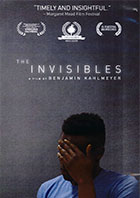
The Invisibles 2014
Distributed by The Video Project, 145 - 9th St., Suite 102, San Francisco, CA 94103; 800-475-2638
Produced by Felix Eisele, Julia Kleinhenz, Bernhard Stegmann, Katja Siegel
Directed by Benjamin Kahlmeyer
DVD, color, 78 min.
College - General Adult
Immigration, Human Rights
Date Entered: 04/14/2017
Reviewed by Brian Falato, University of South Florida Tampa Campus LibraryThe German documentary The Invisibles focuses on four migrants from Syria, Cameroon, and Kenya as they go through the process of seeking asylum in Germany. There is no narrator, just scenes of the men and the officials responsible for processing their claims. Frederick Wiseman has achieved great success using a similar approach, but his films are usually at least twice as long as The Invisibles. What this documentary produces is a feeling that we don’t really understand the men or their situation.
One thing the film is good at showing is the interminable time just waiting for something to happen. Although the exact time to process the applications is not stated, it must certainly seem like a long process to those waiting to hear their fate.
A tactic that isn’t so successful is the frequent scenes of families grouped together in a room. I wasn’t certain if these were the families of the men we see in the video. If so, are they staying with them or are they still in their home countries? Or are they not relatives, but just picked to symbolize the separation of families in this situation?
We do learn that it’s important where a migrant first arrives in Europe. Protocols say that the initial country of arrival is the one to handle the asylum application. When the German officials interview an applicant, they will say if there is evidence that the person had been in another European country before Germany. One man’s response is “I didn’t know where I was.” Whether a truthful statement of confusion or just an attempt to weasel out of a situation, it’s a poignant moment.
But overall, we don’t learn much about the men seen in the video. Reasons for seeking asylum are never explained. The cameras are turned off when a migrant from Cameroon is asked why he wants asylum. This could have been done to encourage the man to speak openly about his situation, but it still causes frustration in the viewer that we can’t get closer to understand his story.
A written explanation at the end of the video says all four of the men featured had their applications for asylum rejected. It further states that in 2013, less than 25% of applicants in Germany were granted refugee status or protection against deportation. If the video had provided more facts and background about the migrant situation in Germany and the individual stories of applicants, it would have been much more rewarding. As it stands, the video cannot be recommended.